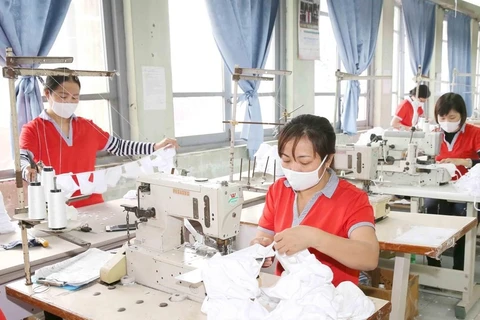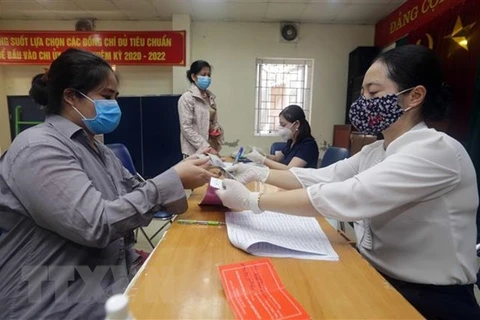Hanoi (VNA) - The Ministry of Labour, Invalids and Social Affairs (MoLISA) is collecting ideas on a draft proposal to the Government in which the National Wage Council suggests it not raise the region-based minimum wage in 2021 after considering the socio-economic circumstances.
The ministry explained that amid the impact of COVID-19, the raising of the minimum wage would affect employment, as businesses are still facing various concerns.
According to calculations by the National Wage Council, with the consumer price index (CPI) estimated to have risen 4 percent each year in 2019-2020, the minimum wage applied in 2020 was still higher than the minimum living conditions, by 1.51 percent. The council added that with a real CPI increase of 3.23 percent in 2020, the regional minimum wage was actually higher than the minimum living conditions, by 2.28 percent.
Therefore, the council recommended that the region-based minimum wage be kept unchanged in 2021 and that adjustments be made in 2022.
According to the draft proposal, upturns were seen in unemployment as well as the number of dissolved enterprises or those suspending operations. Last year, 101,700 companies ceased operations, up 13.9 percent over 2019.
MoLISA said that experts and management officials agree that amid the difficulties in socio-economic conditions, business operations, employment, and incomes in 2020, it is necessary to choose prioritised areas for support, with careful consideration given to wage policy to ensure social sustainability.
The ministry underlined that if the socio-economic situation and relevant factors are favourable, adjustments to the minimum wage could be considered on January 1, 2022 instead of July, as proposed by the Vietnam General Confederation of Labour, which also matches international practice.
Vietnam has made adjustments to the minimum regional wage 18 times since 2000.
The ministry added that if there are any abnormal developments, the National Wage Council will submit a report to the Government for consideration./.
The ministry explained that amid the impact of COVID-19, the raising of the minimum wage would affect employment, as businesses are still facing various concerns.
According to calculations by the National Wage Council, with the consumer price index (CPI) estimated to have risen 4 percent each year in 2019-2020, the minimum wage applied in 2020 was still higher than the minimum living conditions, by 1.51 percent. The council added that with a real CPI increase of 3.23 percent in 2020, the regional minimum wage was actually higher than the minimum living conditions, by 2.28 percent.
Therefore, the council recommended that the region-based minimum wage be kept unchanged in 2021 and that adjustments be made in 2022.
According to the draft proposal, upturns were seen in unemployment as well as the number of dissolved enterprises or those suspending operations. Last year, 101,700 companies ceased operations, up 13.9 percent over 2019.
MoLISA said that experts and management officials agree that amid the difficulties in socio-economic conditions, business operations, employment, and incomes in 2020, it is necessary to choose prioritised areas for support, with careful consideration given to wage policy to ensure social sustainability.
The ministry underlined that if the socio-economic situation and relevant factors are favourable, adjustments to the minimum wage could be considered on January 1, 2022 instead of July, as proposed by the Vietnam General Confederation of Labour, which also matches international practice.
Vietnam has made adjustments to the minimum regional wage 18 times since 2000.
The ministry added that if there are any abnormal developments, the National Wage Council will submit a report to the Government for consideration./.
VNA
























